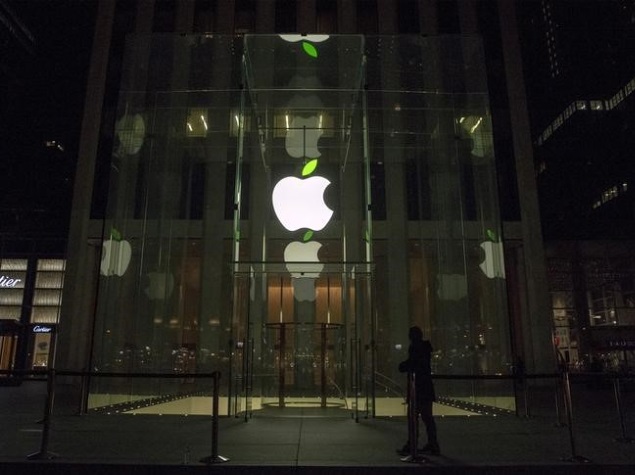US FTC Exploring Apple Rules for Streaming Music Rivals in App Store

Apple recently launched a new music streaming service, Apple Music. It also provides the App Store platform for competing streaming services including Jango, Spotify, Rhapsody and others.
Apple takes a 30 percent cut of all in-app purchases for digital goods, such as music streaming subscriptions and games, sold on its platform.
While $9.99 (roughly Rs. 630) has emerged as the going monthly rate for music subscriptions, including Apple's, some streaming companies complain that Apple's cut forces them to either charge more in the App Store than they do on other platforms or erode their profit margins.
The Federal Trade Commission is looking at the issue but has not begun a formal investigation, said the three industry sources, who requested anonymity. The agency has had meetings with multiple concerned parties, one source said. The agency meets with companies routinely, and a formal investigation may not materialize.
Antitrust lawyers interviewed by Reuters were divided on whether Apple's policies had the makings of an antitrust violation.
A spokeswoman for Apple declined to comment. The FTC also declined to comment.
As all-you-can-eat music subscriptions become more popular among listeners, a wave of companies have rushed in to cater to the demand. Apple has long been a leader in digital music through its iTunes Store, but it has been a relatively late entrant to on-demand streaming.
Streaming services' chief grievances with Apple stem from the company's 30 percent cut. To avoid it, customers can sign up for a streaming service through their Web browser, but the streaming industry sources argue that many consumers do not realize that is an option.
Tyler Goldman, CEO for North America of the music streaming company Deezer, said the bite that Apple takes out of his company's $9.99 U.S. subscription fee leaves little for Deezer.
"The margin in music is quite small, and the App Store diminishes the margin."
"It will be an issue for the industry going forward. You can either raise your prices and not be competitive with Apple's price, or you can have no margin," he said, adding that he was unaware of whether Deezer has talked to the FTC.
Two of the industry sources say that the antitrust concerns focus on restrictions in the App Store. These include a prohibition on advertising in the app that the company is on other platforms, a ban on marketing in the app that consumers can also buy directly from the company's website, and a ban on linking to a company's website from within the app. These restrictions apply to all apps, not just music streaming apps.
Although Google also offers a music subscription service and charges a 30 percent transaction fee in its app store, its policies for app sales have drawn less ire from rival streaming services. Industry sources say the company places fewer restrictions on those transactions.
Although Apple dominates the digital music business primarily through iTunes, its share of the global smartphone market is relatively small. Google's Android operating system accounts for 78.9 percent, with Apple's iOS system clocking in at 17.9 percent, according to research firm Gartner based on sales in the first quarter of 2015.
Antitrust lawyers knowledgeable about the tech industry were split on whether Apple's policies violated antitrust law. Apple is free to charge whatever fee it likes for transactions in the App Store, some argue, and companies do not have to sell their goods there.
It is legal to have a monopoly but it is not legal for monopolies to use their clout to hurt competitors, said Jeffrey Jacobovitz of the law firm Arnall Golden Gregory.
Apple's critics may be seeking to convince the FTC to use Section Five of the FTC Act, which prohibits "unfair or deceptive acts or practices," to pursue Apple, he said.
Since the Justice Department's successful prosecution of Apple for colluding with publishers to push up the prices of ebooks, the FTC may be inclined to take a closer look at Apple's involvement in the music business, said Jacobovitz.
Another antitrust lawyer dismissed most of the concerns as companies complaining about actions that were undoubtedly aggressive, but still legal.
"They're (Apple) tough business people," said the lawyer, who spoke on the condition of anonymity.
© Thomson Reuters 2015
Catch the latest from the Consumer Electronics Show on Gadgets 360, at our CES 2026 hub.
Related Stories
- Samsung Galaxy Unpacked 2025
- ChatGPT
- Redmi Note 14 Pro+
- iPhone 16
- Apple Vision Pro
- Oneplus 12
- OnePlus Nord CE 3 Lite 5G
- iPhone 13
- Xiaomi 14 Pro
- Oppo Find N3
- Tecno Spark Go (2023)
- Realme V30
- Best Phones Under 25000
- Samsung Galaxy S24 Series
- Cryptocurrency
- iQoo 12
- Samsung Galaxy S24 Ultra
- Giottus
- Samsung Galaxy Z Flip 5
- Apple 'Scary Fast'
- Housefull 5
- GoPro Hero 12 Black Review
- Invincible Season 2
- JioGlass
- HD Ready TV
- Laptop Under 50000
- Smartwatch Under 10000
- Latest Mobile Phones
- Compare Phones
- Vivo Y500i
- OnePlus Turbo 6V
- OnePlus Turbo 6
- Itel Zeno 20 Max
- OPPO Reno 15 Pro Mini 5G
- Poco M8 Pro 5G
- Motorola Signature
- Vivo Y50e 5G
- Lenovo Yoga Slim 7x (2025)
- Lenovo Yoga Slim 7a
- Realme Pad 3
- OPPO Pad Air 5
- Xiaomi Watch 5
- Huawei Watch 10th Anniversary Edition
- Acerpure Nitro Z Series 100-inch QLED TV
- Samsung 43 Inch LED Ultra HD (4K) Smart TV (UA43UE81AFULXL)
- Asus ROG Ally
- Nintendo Switch Lite
- Haier 1.6 Ton 5 Star Inverter Split AC (HSU19G-MZAID5BN-INV)
- Haier 1.6 Ton 5 Star Inverter Split AC (HSU19G-MZAIM5BN-INV)

















